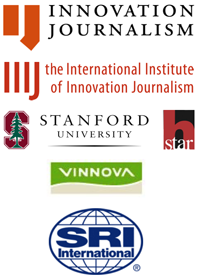
"Innovation is the only path to growth, but the US is lousy at it." says Curt Carlson, head of the research institute SRI International in Silicon Valley. He is sharing his best tips for companies who wants to survive in the new, fast moving world of business.
The number one question that any corporation should ask themselves, according to Mr. Carlson, is: what is the customer value?
“This is the most important definition in any business, but have you ever sat in a company who has had that discussion?” he asks rhetorically.
Mr. Carlson is an expert on innovation.
“The second most important definition for a company is value proposition," he continues. "Why should your customer stick to you?"
From experience, Mr. Carlson knows that many enterprises focus primarily on business ideas, but forgetting about customer needs and the cost-benefit ratio.
The problem, he says, is that companies today lack an innovation system. For innovation to take place, five things are necessary, he says. In addition to filling a customer need and creating value, the company must have people with new ideas, innovation teams and an organization adequately aligned to make use of it all.
Today, the industrialized economies are increasingly based on knowledge, as opposed to manufacturing. With this, a lot of new opportunities appear. The trick is to take advantage of them.
Governmental policies should normally aid in the process, but American policies leave a lot left to wish for, according to Mr. Carlson. With the introduction of Sarbanes-Oxley Act in 2002, it has become a lot more bureaucratic and costly for companies to go public. The consequence is that fewer companies grow big today.
“The waste is enormous”, says Mr. Carlson.
Mr. Carlson says that 40 percent of low tech companies survive after their five initial years, 10 percent of the consumer product companies and one-quarter of all the companies founded in Silicon Valley.
The immigration policies are not exactly aiding the inflow of brains either.
“We just passed a law making it next to impossible for Einstein to come to the US,” says Mr. Carlson.
He is disappointed with the media, who mainly focus on large companies and fails to shed light on interesting startups and medium sized enterprises. And he thinks it is imperative for innovation to become a discipline, a subject that can be taught, applied and improved in order to raise the awareness of it among the public.
“In order to play a piano you need to know how to sit, hold the hands, read the notes. It is the same with innovation”.With this, Mr. Carlson - who also happens to be a classical violinist - ends his speech.
But it is uncertain whether great musicians like Ray Charles, who was blind and therefore unable to read noted, would agree with him.
SRI International was founded in 1946 by Stanford University and became independent in 1970. It is a nonprofit scientific research institute conducting client-sponsored research and development for government agencies, commercial businesses, foundations, and other organizations. Some of their inventions include the computer mouse, electronic banking and technology for endoscopic surgery. SRI receives 0.5 bn USD in state funding per year and employs 2200 people all around the world.
Wednesday, March 5, 2008
Companies Lack Innovation Systems
Subscribe to:
Post Comments (Atom)


No comments:
Post a Comment